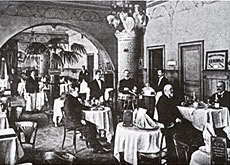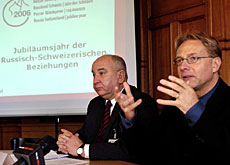Russia and Switzerland finding common ground

Swiss-Russian relations have gone through various highs and lows over the centuries, often full of contradictions, historian Hans-Ulrich Jost tells swissinfo.
From land of opportunity for emigrants to empire of evil, the Russian empire and later the Soviet Union always had the attraction of being a big market for Swiss businesses.
Up to 1918, some 60,000 Swiss people sought their fortune in Russia, often successfully. But with the Bolshevik revolution things changed completely and the Soviet Union became enemy number one.
Jost says the spectre of communism has not quite vanished from Swiss consciousness 14 years after the Soviet Union ceased to exist.
He is one of Switzerland’s best-known historians who worked as a professor at Lausanne University before he retired in last year.
swissinfo: In the 19th century Russia was a popular destination for emigrants, why was that?
Hans-Ulrich Jost: Russia was quite a land of opportunity, the California of Europe, where one could earn a lot relatively quickly.
When Russia began modernising in the 19th century, Swiss industrialists, technicians and specialists in agriculture participated in the economic boom. Some businessmen returned home ten years later as millionaires.
swissinfo: Cultural relations were also developing at this time with Swiss master builders and educators active in Russia. What encouraged the Swiss connection?
H-U. J.: Particularly in the 18th century, Russia was looking for scientific and cultural connections with the West. For this reason, Swiss academics, for example mathematicians, but also Swiss teachers were in demand with the Russian aristocracy. Swiss academics were also active in St Petersburg Academies.
swissinfo: During the First World War, the Soviet mission in Bern was expelled. What led to this drastic step?
H-U.J.: Towards the end of the war, the Russian revolution took place, and with the Bolsheviks in charge, Russia was no longer considered a friendly country.
A Russian mission in Bern – without official status – was forced out, because it was accused of agitating revolution with left radical forces. However, there was never any evidence produced.
The absence of diplomatic ties proved to be a handicap, because despite the virulent anti-communism and anti-Bolshevism, Swiss business circles were interested in having access to the Russian market.
During the Second World War, Switzerland was on the verge of concluding an economic treaty with the Soviet Union. But after Hitler’s attack on Russia in 1941, all relations with the communist giant were broken off.
This led to a great crisis in Swiss history: as victory approached for the Allies, among them the Soviet Union, the Swiss foreign minister Marcel Pilet-Golaz tried very delicately to seek a rapprochement with Russia.
In return he got a very curt rebuff from Stalin. It was only after difficult negotiations that diplomatic relations were resumed in 1946.
swissinfo: The Cold War in Switzerland was centred on the stigmatisation of communism. Was this related to internal political tactics, to spy on all left-wing activists in the country?
H-U.J.: Anti-communism was one of the essential political motives of the mainstream parties in the 20th century. It served to reinforce internal cohesion.
At the same time, it was a useful tactic to accuse the Swiss left of being Bolsheviks. Anti-communism ultimately came to count as a superior moral value in Switzerland.
Despite that Switzerland continued to press ahead with trade with Russia, because as in the 18th and 19th centuries, there were large markets to be exploited.
That led to a type of schizophrenia in Swiss behaviour. On the one hand the country declared itself neutral, on the other hand it was virulently anti-communist, hoping at the same time to make trade with this evil enemy.
Switzerland still wasn’t reconciled with this very contradictory situation even after the fall of the Berlin wall at the end of the 20th century.
swissinfo: Is the Cold War not yet over in Swiss minds?
H-U.J: I would say that the Cold War in people’s minds has not yet been intellectually dealt with. Subliminal thoughts of the evil empire still remain associated with left-wing politics, despite the collapse of the Soviet Union.
swissinfo-interview: Renat Künzi
In the 18th century Swiss master builders, academics and teachers were in great demand in Russia.
In the 19th century Russia became a land of opportunity for Swiss emigrants.
After the Bolshevik Revolution of 1917, Russia became an enemy. The suspension of diplomatic contacts until 1946 had a negative impact on the Swiss economy.
Switzerland’s attitude during the Cold War was contradictory. Communism was the arch-enemy but Swiss businesses were pushing into the Russian market.
In January 2006, Switzerland and Russia agreed on talks for a free-trade agreement.
Currently 576 Swiss citizens are registered as resident in Russia.
Switzerland opened its first consulate in St Petersburg 190 years ago, followed by its first embassy 90 years later.
The two countries resumed diplomatic relations 60 years ago after a 28-year rift.
In this celebratory year, 60 projects and more than 100 events will take place, coordinated by Presence Switzerland.

In compliance with the JTI standards
More: SWI swissinfo.ch certified by the Journalism Trust Initiative

You can find an overview of ongoing debates with our journalists here. Please join us!
If you want to start a conversation about a topic raised in this article or want to report factual errors, email us at english@swissinfo.ch.